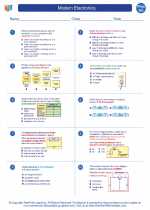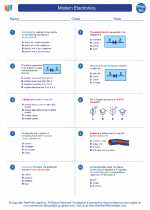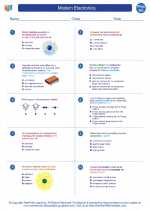Modern Electronics
Modern electronics is a branch of physics that deals with the behavior and effects of electrons, particularly in the design and use of electronic devices and systems. It encompasses a wide range of technologies, including semiconductors, transistors, integrated circuits, and digital electronics.
Key Concepts in Modern Electronics
1. Semiconductors: These are materials with electrical conductivity between that of a conductor and an insulator. They are the foundation of modern electronics and are used in the production of diodes, transistors, and integrated circuits.
2. Transistors: These are semiconductor devices used to amplify or switch electronic signals and electrical power. They are the building blocks of modern electronic devices and are essential in the design of amplifiers, oscillators, and digital circuits.
3. Integrated Circuits: Also known as microchips, these are a set of electronic circuits on one small flat piece of semiconductor material, typically silicon. They are used in virtually all electronic equipment today and have revolutionized the field of electronics.
4. Digital Electronics: This branch of electronics deals with digital signals and the use of digital logic gates to process and manipulate these signals. It forms the basis of modern computing and communication systems.
Study Guide for Modern Electronics
To gain a solid understanding of modern electronics, it is important to focus on the following key areas:
- Start with the basics of electricity and magnetism, as these are the foundational concepts for understanding electronics.
- Study the behavior of electrons in different materials, particularly conductors, insulators, and semiconductors.
- Learn about the principles of diodes and transistors, including their applications in amplification, switching, and signal processing.
- Understand the design and function of integrated circuits, including the different types and their applications in various electronic devices.
- Explore digital electronics, including binary number systems, logic gates, and the design of digital circuits.
- Get hands-on experience with electronic components and circuits through practical projects and experimentation.
- Stay updated with the latest advancements in modern electronics, such as nanoelectronics, quantum computing, and emerging electronic technologies.
By mastering these key concepts and areas of study, you will develop a comprehensive understanding of modern electronics and its applications in various fields.
Good luck with your studies!
.◂Physics Worksheets and Study Guides High School. Modern Electronics

 Worksheet/Answer key
Worksheet/Answer key
 Worksheet/Answer key
Worksheet/Answer key
